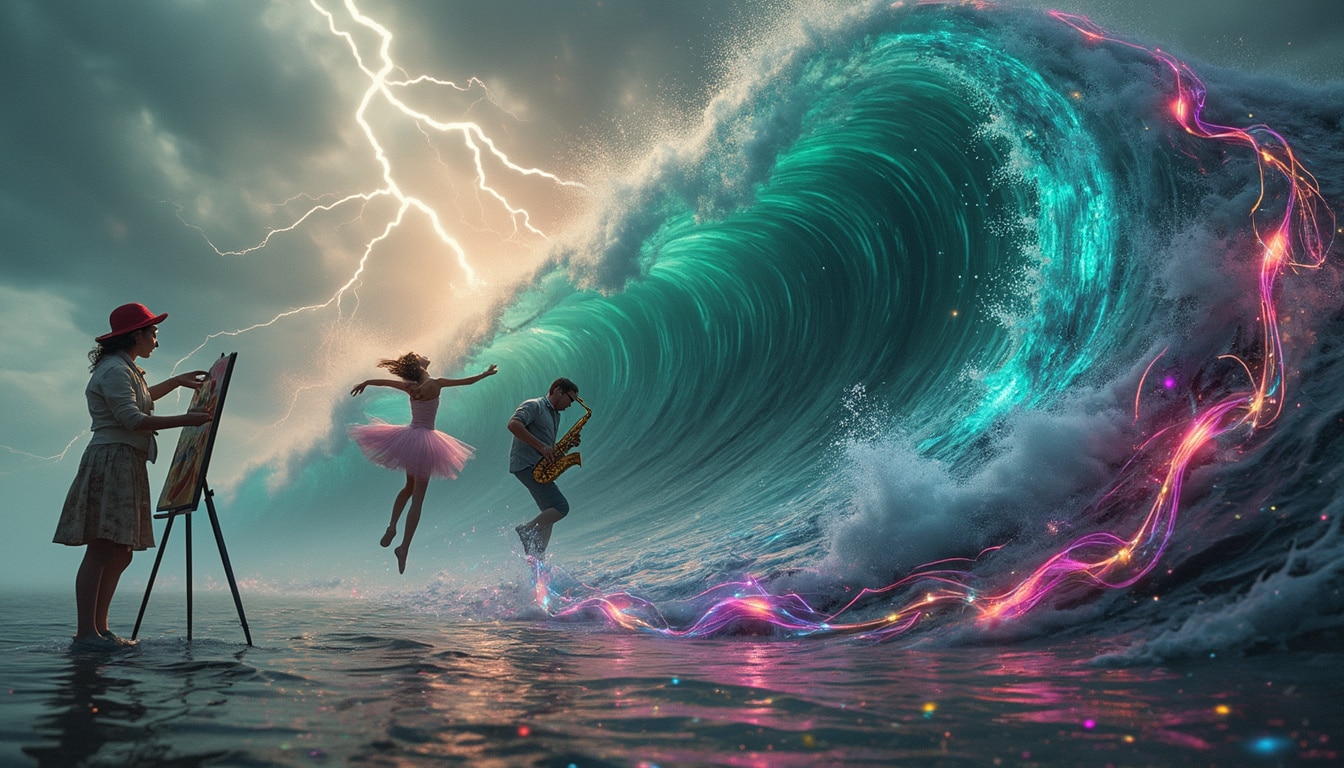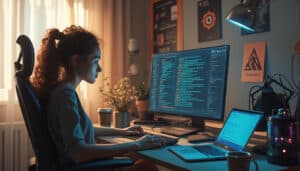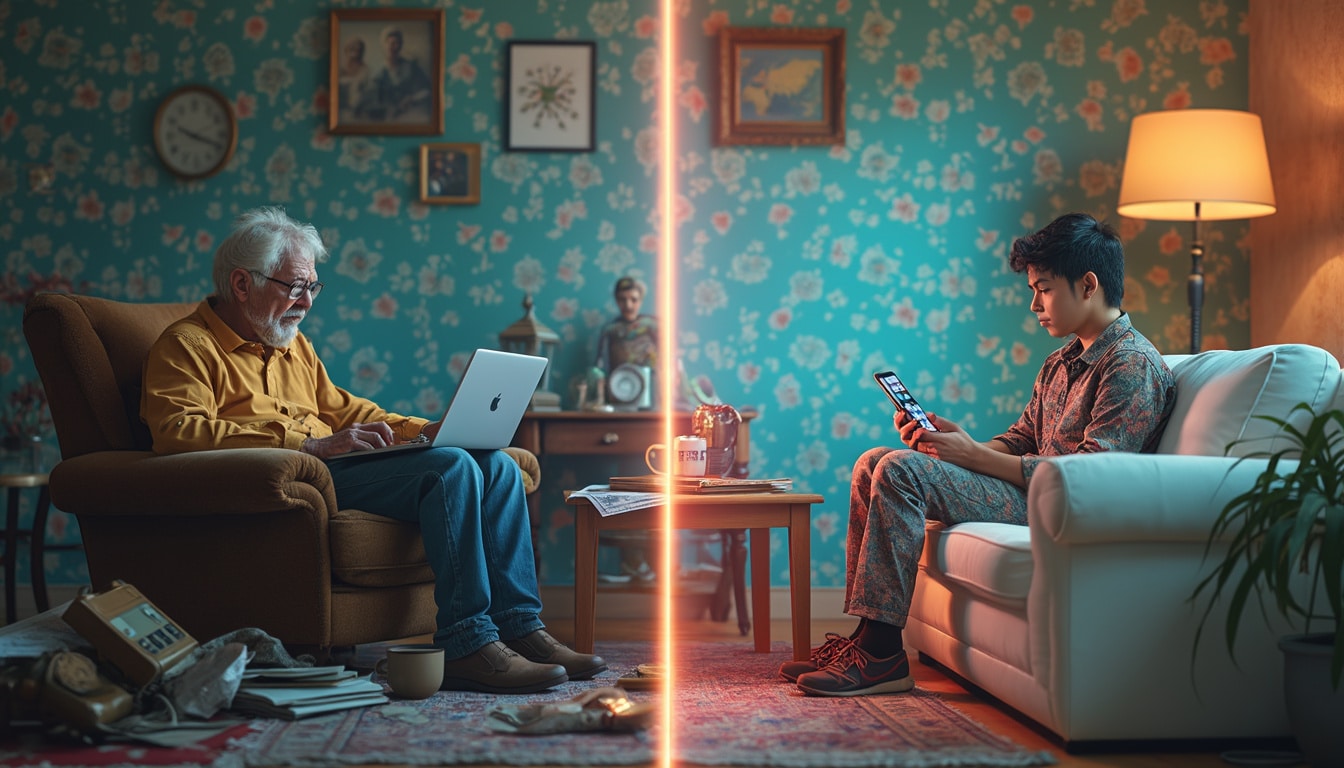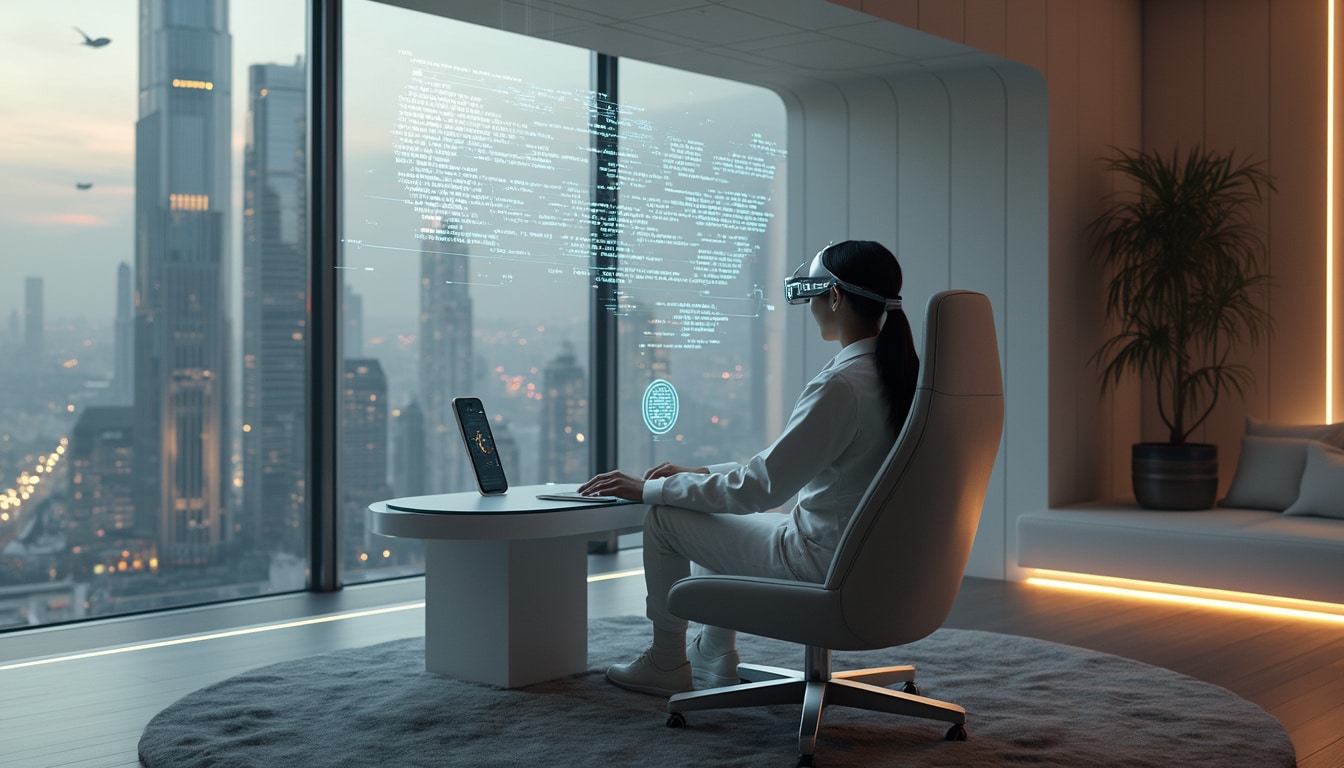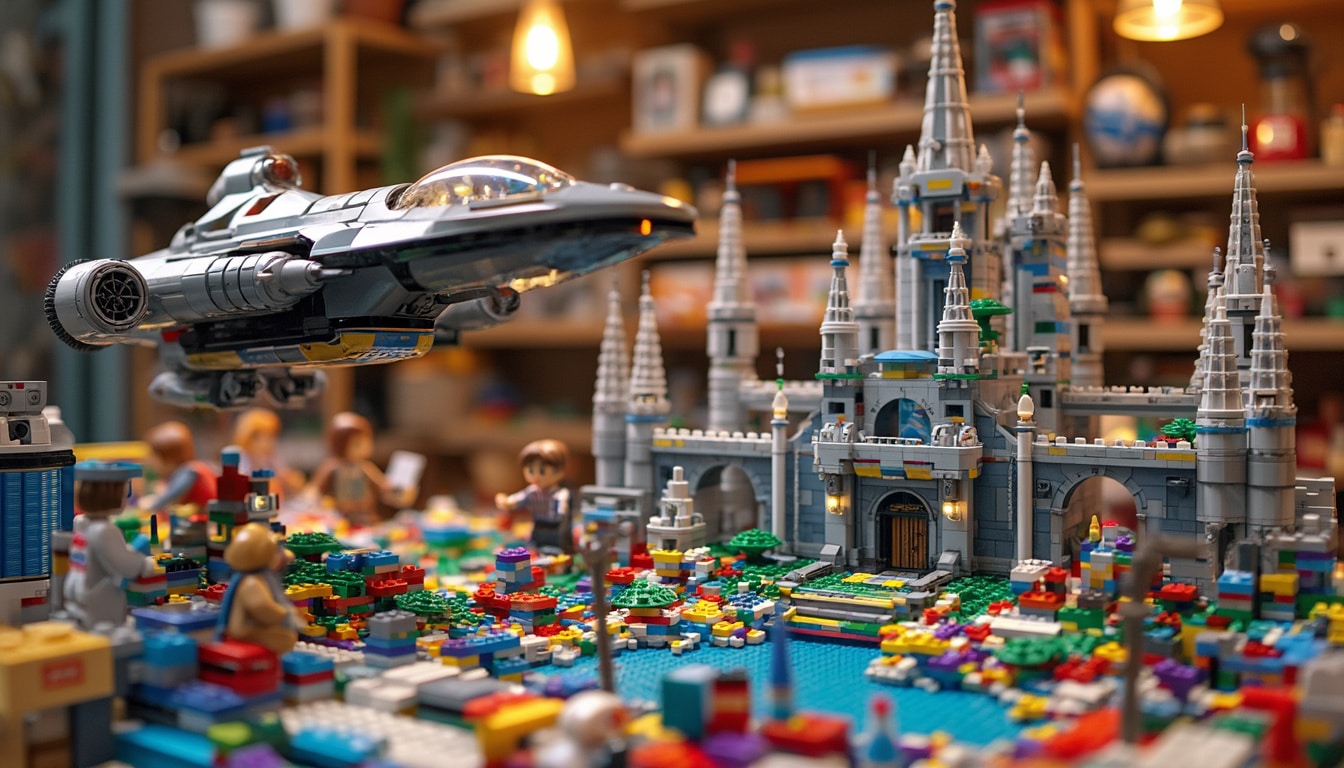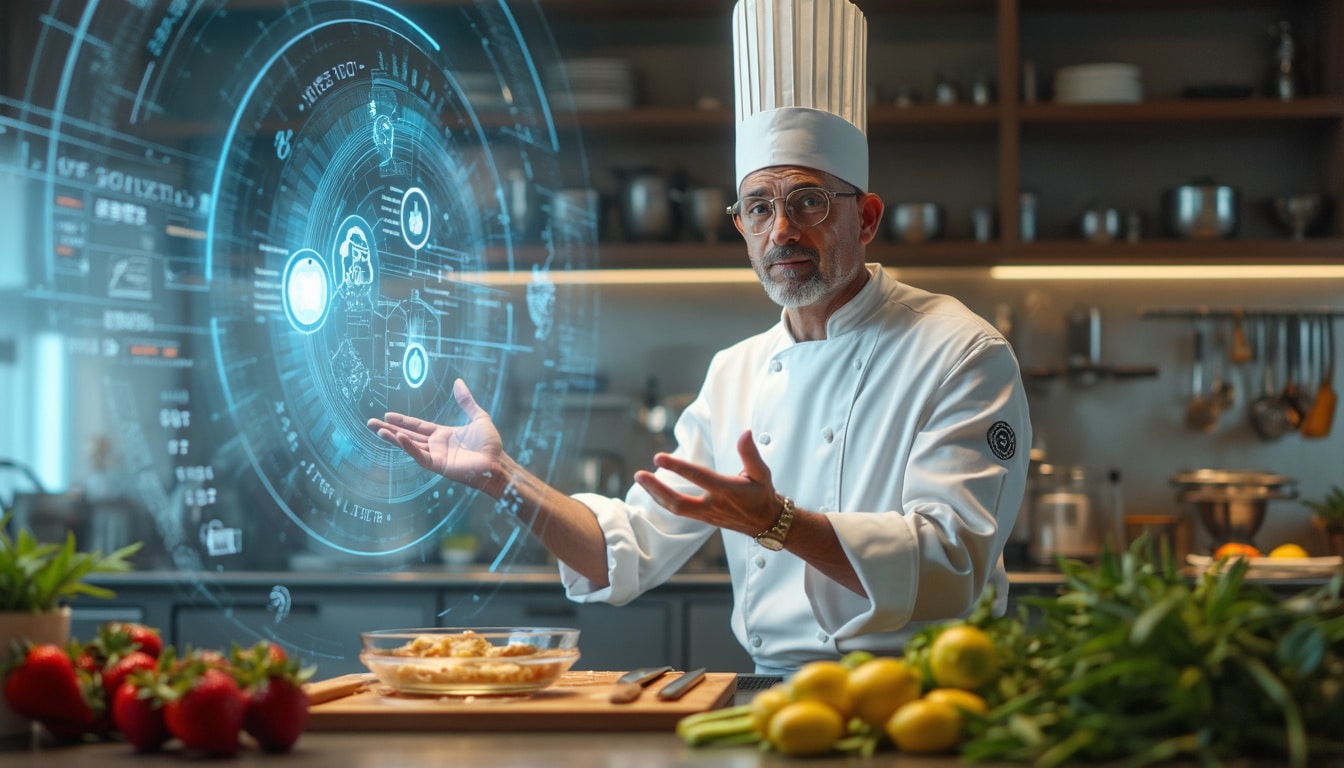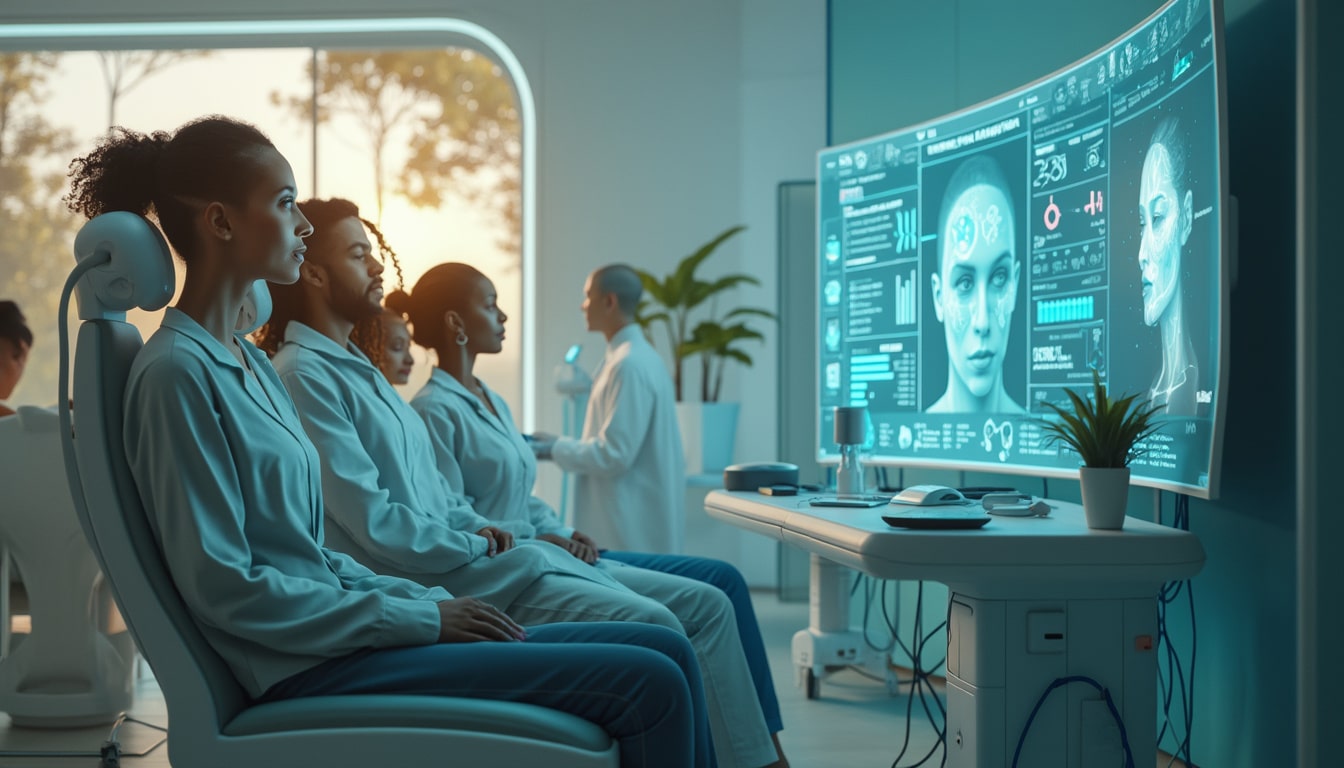« `html
Every day, the music streaming world gets a bit more… robotic. AI-generated songs are popping up like mushrooms after rain. On Deezer alone, they’re already making up 10% of daily releases.
This digital musical snowstorm is not just a trend; it’s raising serious eyebrows in the music industry, both in Switzerland and across the globe. Artists are witnessing a swift transformation of their traditional roles as algorithms now prefer synthetic sounds that are almost indistinguishable from human creations. Meet the « ghost artists » — AI-driven creators soaring in popularity through automated playlists designed for sleep, relaxation, or concentration. These tracks are amassing millions of listens, making it increasingly tough for classic musicians to maintain their visibility.
Christian Wicky, co-director of the Irascible label, shares, « It’s very difficult to spot a song created by AI, especially when there are no vocals. » The widespread distribution of these AI-generated tunes is overshadowing traditional musicians, who now struggle to stay relevant.
Streaming platforms are embracing this trend, aiming to bypass the hefty costs of copyright royalties. For instance, Spotify paid nearly 9 billion francs to the music industry in 2023. Wicky warns, « These platforms are likely to push further to eliminate the need to pay royalties. » By creating their own music through AI, they can churn out content more cheaply.
Artists like Stephan Kohler, known as Mandrax, are finding themselves in a relentless battle against machines replicating their work. « I’m literally fighting against machines, » Kohler says. Artists often receive automated responses and face long waits before their tracks are removed. In the meantime, their creations are streamed without compensation, sometimes even used to train other AIs. With 70% of their income dependent on these platforms, the threat is very tangible.
Facing this, artists are calling for legislation to regulate AI usage in music. « We have a Netflix law in Switzerland, why not a Spotify law? » Kohler questions. Clear regulations could set firm boundaries, but without swift action, the Society of Swiss Authors predicts a 24% drop in creators’ revenue by 2028, a number set to climb if nothing changes soon.
Table of contents
Togglethe rise of ai-generated music on streaming platforms
Every day, streaming platforms find themselves overwhelmed by a surge of music created by artificial intelligence. On Deezer alone, AI-generated tracks constitute a staggering 10% of all titles released daily. This tidal wave of computer-crafted tunes is not just a fleeting trend; it’s reshaping the very landscape of the music industry. As algorithms become more sophisticated, the ability of AI to produce music that rivals human creativity continues to improve, making it increasingly difficult for listeners to discern between man-made and machine-made songs.
This explosive growth is not limited to Deezer. Other major streaming services are experiencing similar trends, with AI-produced content flooding their libraries. The ease with which these platforms can generate and upload vast quantities of music means that the market is saturated with an endless variety of sounds, all designed to capture the attention of today’s discerning listeners. The implications for artists are profound, as they find themselves competing against an ever-expanding pool of AI-generated alternatives.
how ai is transforming artists’ roles
The transformation of artists’ roles in the age of AI is one of the most significant shifts in the music industry. Traditionally, musicians have been the creative force behind their work, but now, algorithms are taking center stage. These intelligent systems prioritize AI-generated sounds over human input, often creating tracks that are nearly indistinguishable from those crafted by human hands. This shift challenges the fundamental identity of what it means to be an artist in the digital age.
One of the most intriguing aspects of this transformation is the emergence of « ghost artists. » These AI-created entities gain popularity primarily through automated playlists that cater to specific moods or activities, such as sleep, relaxation, or concentration. These tracks can amass millions of listens, effectively eclipsing human musicians who struggle to maintain visibility amidst the relentless influx of AI content.
Christian Wicky, co-director of the label Irascible, emphasizes the challenge: « It is very difficult to spot a song created by AI, especially when there are no vocals. » This skepticism extends to even the most discerning listeners, who find it increasingly hard to separate genuine emotional expression from algorithmic efficiency. The situation becomes even more complicated as AI continues to refine its ability to mimic human creativity, raising questions about the future role of traditional artists.
The issue extends beyond mere competition; it’s about the very essence of human creativity and its place in a world dominated by machines. For instance, renowned artist Celine Dion has publicly warned her fans about the proliferation of AI-generated fake songs, illustrating the growing concern among established musicians about the integrity of their art.
the economic strategy behind ai music proliferation
Behind the proliferation of AI-generated music lies a calculated economic strategy pursued by streaming platforms. One of the primary motivations is the desire to minimize the costs associated with royalty payments. For example, Spotify disbursed nearly 9 billion francs to the music industry in 2023. As AI-generated content becomes more prevalent, platforms aim to reduce these expenses by producing their own music using artificial intelligence, which significantly lowers the cost of generating large volumes of content.
This strategy is not just about cutting costs; it’s also about maintaining a vast, diverse library that caters to an ever-expanding global audience. By leveraging AI, streaming services can continuously update their catalogs with fresh, tailored content without the need for ongoing financial commitments to artists and rights holders. This approach ensures a steady stream of new material that can be fine-tuned to match the preferences and trends of listeners worldwide.
Moreover, the economic incentives align perfectly with the capabilities of AI. As these technologies evolve, the production of music through artificial intelligence becomes more efficient and less dependent on human intervention. This shift not only reduces costs but also accelerates the pace at which new music can be introduced to the market. The result is an ecosystem where AI-driven content dominates the playlists, often at the expense of human musicians.
Furthermore, AI-generated music has already made significant strides. A notable example is the revival of The Beatles through artificial intelligence, which took home a Grammy for Best Rock Song. This achievement underscores the potential for AI to not only create music but also gain critical acclaim, further incentivizing platforms to invest in machine-generated content.
the struggle of traditional artists against ai
As AI-generated music continues to gain traction, traditional artists face an uphill battle to maintain their visibility and revenue. Stephan Kohler, known by his stage name Mandrax, exemplifies the challenges artists encounter. He spends countless hours reporting unauthorized copies of his own tracks, a task that feels like « fighting against machines. » The automated nature of AI means that artists receive mostly automatic responses and endure long waits before any unauthorized content is removed.
During this time, the AI-generated versions of their work continue to generate streams and accumulate plays, often without providing any form of compensation to the original artists. In some cases, these copies are used to train other AI systems, creating a cycle of exploitation that leaves artists struggling to keep up. For someone like Kohler, whose earnings are already 70% dependent on streaming platforms, this poses a significant threat to their livelihood.
The situation becomes even more dire as traditional musicians find it increasingly difficult to stand out amidst the sheer volume of AI-produced music. The automated promotion of AI tracks through playlists and recommendation algorithms means that human-created songs are often buried under a deluge of machine-generated alternatives. This not only diminishes the chances for human artists to be discovered but also affects their overall income and career sustainability.
The issue of AI’s encroachment on traditional artistry is not unique to individual cases. The broader implication is a systemic shift where human creativity is overshadowed by technological efficiency. This scenario raises urgent questions about the future of music and the sustainability of careers for those who rely on their creative talents to make a living.
legislative calls: the future of music regulation
In response to the growing dominance of AI in music production, artists are advocating for legislative measures to regulate the use of artificial intelligence in the industry. Stephan Kohler has suggested the implementation of a « Spotify law » in Switzerland, drawing a parallel to existing entertainment regulations like the « Netflix law. » The aim is to establish clear boundaries and guidelines that protect artists from the unchecked proliferation of AI-generated content.
A potential regulation could involve setting limits on the number of AI-generated tracks allowed on streaming platforms, ensuring that human artists retain a fair share of visibility and revenue. Additionally, there could be requirements for platforms to disclose the extent of AI involvement in content creation, providing transparency for listeners and safeguarding the rights of original creators.
The Société suisse des auteurs has projected a 24% reduction in revenue for creators by 2028 if no action is taken. This alarming forecast underscores the urgency of implementing regulatory measures to protect the livelihoods of musicians. Without intervention, the economic disparity between AI-generated content and human-created music is expected to widen, further marginalizing traditional artists.
Furthermore, the broader implications of AI in creative industries extend beyond music. For instance, in politics, AI-generated imagery is influencing electoral dynamics, highlighting the pervasive impact of artificial intelligence across various sectors. Such developments reinforce the need for comprehensive legislation that addresses the multifaceted challenges posed by AI in the creative domain.
As the debate on AI regulation intensifies, the future of music hinges on the balance between technological advancement and the protection of human creativity. Establishing robust legal frameworks is essential to ensure that the music industry remains a viable space for artists to thrive, preserving the authenticity and emotional depth that only human musicians can provide.
# Answer>


